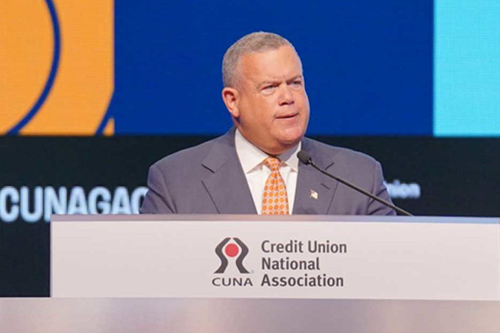
Opening his term as chair of the Credit Union National Association (CUNA)’s Board of Directors with a keynote address at CUNA’s Governmental Affairs Conference in Washington, DC earlier this month, Budet challenged the audience to lead with impact.
“Perhaps you’ve heard it said, ‘No margin, no mission.’ I suggest that we consider reversing that: ‘No mission, no margin,’” he said.
“We should be focusing on how—through our mission—we can offer a value proposition that will bring business to us that otherwise would not consider us, and let that drive the margin we need to operate,” he added.
Credit unions like Vancity in Vancouver, British Columbia are leading the way, Budet said. There, efforts to support women-owned businesses don’t end with a loan; they include a business coach and connections with local partners to ensure long-term success.
“For Vancity, a loan is not a statistic—a loan is a person,” Budet said.
Inspired by Vancity and other credit unions that focus on member and community financial well-being, Budet and the University Federal Credit Union (UFCU) team decided to reframe their work—and redefine their vision. First, they identified three local needs that aligned with their core competencies: supporting education, filling middle-skills jobs and boosting affordable housing. Then they pledged to impact quality of life for 1 million people by 2030.
“We changed our vision, which is now simply: ‘A financially healthy community,’” Budet said.
As competition makes it increasingly difficult for credit unions to differentiate their value proposition in the marketplace, perhaps it’s time to rewrite the marketing message, too.
Many credit unions are still telling a story about rates, fees and convenience, Budet said. “Don’t get me wrong, these elements are critical, but they are not differentiators. They will not set your credit union apart.” Instead, credit unions can tell a “different, more compelling story” by “talking about the outcomes their investments have in the communities they serve.”
Credit unions can tell a “different, more compelling story” by “talking about the outcomes their investments have in the communities they serve.”
In Texas, a top priority on campuses is making sure first-generation college students graduate, Budet said. Nationwide, 43 percent of first-generation students leave college without a degree, compared to 20 percent of non-first generation students. Budet cited UFCU’s work supporting first-generation students as an example of how to reframe messaging.
“Did you give the local university a million dollar grant? Or did you enable 100 first-generation college students to complete their education?” he said.
As credit unions and other cooperatives focus more on the impact they have on people, not balance sheets, they will naturally embrace the 6th and 7th cooperative principles: “cooperation among cooperatives” and “concern for community.”
Budet called those last two principles “our collaborative superpowers” that truly define the cooperative difference in the marketplace.
“In the end, maybe the value proposition that we’re looking for lies [in those principles].”


